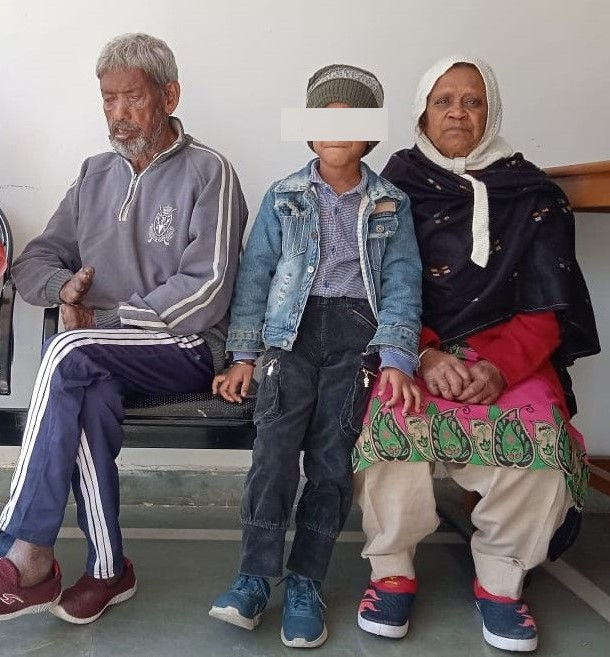Shadow of leprosy in the whole life:
- kneusgnoida

- Jan 30, 2023
- 3 min read

Leprosy has affected humanity for more than 4,000 years. An age old disease, the one who gets it, keeps him away from family, village, city, and society. Which we know by the name of leprosy. Leprosy is also one of the common diseases affecting the skin and nerves. It is completely cured by the treatment of Multi drug therapy (MDT), But due to the effect of nerves, there can be a deformity in face, eyes, hand and feet. In this way the sensory and motor nerves get damaged. Due to these damages human beings do not feel any kind of sensation and the motor nerves too become unable to function. If it is not taken care, the fingers and toes gradually claw and get destroyed. Now this person does not have leprosy but the deformity caused by leprosy makes his identity anonymous for many generations to come. He gets a new name "leper or leprosy patient". From this shadow of pain and shame he himself and his family can never get out. Although the organizations objected to calling the name leper or leprosy patient and brought awareness among the people that it is a common disability, they should also be treated like other diseases. But the society is unable to understand and accept them as differently abled or disfigured people. Where adequate treatment is available, forcible quarantine or separation of patients is unnecessary, but in spite of this, there are still cases all over the world and specially in India (which still has more than 1,000 leprosy colonies), Leprosy colonies present in countries like China, Romania, Egypt, Nepal, Somalia, Liberia, Vietnam, and Japan.
They find it appropriate to leave society. And they settle their own world. Even there we do not allow them to live, we give a different name to their world which is called a leper’s colony or leprosy colony. I got a chance to understand and feel them closely. Whenever I met those people, I could see nothing else on their faces except sadness, as if they have committed such a big crime for which there is no end to the punishment. Those people who have also become accustomed to living in that condition. But now they also have a growing desire to give good education to their children. Many people come forward to help but it is not much. They need support in maintaining their own identity with respect like differently abled (Divyang) in the society. Instead of separating from society, give them a helping hand in the form of a little donation. There is a lot of discrimination against them, it should be ended. With the efforts of governments, we all have come to know that leprosy does not spread to others after completing the course of MDT medicine, "and disfigurement is not leprosy, it is damage caused by that disease". We should treat them normally.
As per the latest data from National Leprosy Eradication Programme (NLEP), a total of 65,147 new leprosy cases were detected during the year 2020-21 in India. We found very high rates of disability and deformity among leprosy patients indicating a possible huge burden of morbidity among leprosy patients in central India. Grade 2 disability was found among 32% of the patients with leprosy, whereas a total of 60% of our patients had either grade 1 or grade 2 disabilities. The trophic ulcer was found among 20% and claw hand among 14% of leprosy patients.
Legal discrimination:
The historical legacy and social stigma towards leprosy are evidenced by various laws containing discriminatory clauses against leprosy patients. Laws in the states of Chhattisgarh, Rajasthan, Madhya Pradesh, Andhra Pradesh and Orissa prevent leprosy patients from participating in local elections. Other laws include the Motor Vehicles Act of 1939 which prohibited leprosy patients from obtaining a driving license and the Indian Railways Act of 1990 which prohibited leprosy patients from traveling by train.
Over 100 discrimination laws were challenged in a petition by the Legal Policy of the Legislative Center on 4 December 2017. The Supreme Court recommended the matter to the government following a previous Law Commission report. Specific laws and regulations named include section 13 of the Hindu Marriage Act, which allows leprosy as a justification for divorce; Section 70 (3) (b) of the Orissa Municipal Corporation Act, which bars leprosy patients from running for the office of corporator; and other similar laws.
Many of these laws were written before the development of multi-drug therapy (MDT), a treatment that can make leprosy non-infectious and prevent further deterioration, and they have not been updated since December 2020. For example, almost all marriage and divorce laws in India consider leprosy as a ground for divorce with the Special Marriage Act of 1954 declaring a leprosy patient "sick". These laws do not reflect the current understanding of leprosy.







Comments